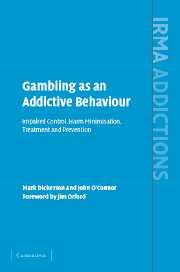Book contents
- Frontmatter
- Contents
- Preface
- Declaration
- Executive Summary
- Glossary
- Foreword
- List of Tables
- List of Figures
- 1 The Research Context
- 2 Research into Impaired Control of Gambling Behaviour, Definition and Measurement: Traditional Psychometric and Mathematical Psychology Approaches
- 3 Impaired Control and its Relationship to other Variables Implicated in the Development of Pathological Gambling
- 4 Models of Impaired Self-Control of Gambling
- 5 Implications for Treatment Approaches to Problem Gambling Arising from the Model of Impaired Control
- 6 Implications for Harm Minimisation in the Management of Problem Gambling: Making Sense of “Responsible Gambling”
- 7 A Case Study of “Responsible Gambling” Strategies within a Single Jurisdiction: Victoria, Australia
- 8 Conclusions
- References
- Index
8 - Conclusions
Published online by Cambridge University Press: 07 September 2009
- Frontmatter
- Contents
- Preface
- Declaration
- Executive Summary
- Glossary
- Foreword
- List of Tables
- List of Figures
- 1 The Research Context
- 2 Research into Impaired Control of Gambling Behaviour, Definition and Measurement: Traditional Psychometric and Mathematical Psychology Approaches
- 3 Impaired Control and its Relationship to other Variables Implicated in the Development of Pathological Gambling
- 4 Models of Impaired Self-Control of Gambling
- 5 Implications for Treatment Approaches to Problem Gambling Arising from the Model of Impaired Control
- 6 Implications for Harm Minimisation in the Management of Problem Gambling: Making Sense of “Responsible Gambling”
- 7 A Case Study of “Responsible Gambling” Strategies within a Single Jurisdiction: Victoria, Australia
- 8 Conclusions
- References
- Index
Summary
Impaired Self-control of Gambling
In Dickerson & Baron (2000) the suggestion was made that research examining problem gambling might be simplified if the preferred dependent variable was impaired self-control rather than the heterogeneous consequences that comprise the diagnostic criteria of pathological gambling (APA, 1994). The proposal was derived from the arguments of Heather et al. (1993) concerning alcoholism: impaired control as the essential construct in the psychological conceptualisation of addiction. Impaired self-control of gambling was defined as an inability to consistently maintain preferred limits to expenditure of time and money on gambling. From the evidence and arguments presented in the previous chapters, the following conclusions may be drawn.
Measurement
The most consistent findings have been demonstrated by the measurement of impaired self-control of gambling: the fundamental work of Kyngdon (2003) providing evidence for a continuous quantitative dimension (from effortless self-control to an inability to impose control over their gambling behaviour), and the use of a traditional psychometric approach (Scale of Gambling Choices (SGC), Baron et al., 1995) in a number of studies demonstrated acceptable reliability, validity and factorial coherence (particularly for the 12-item version: O'Connor & Dickerson, 2003; Kyngdon, 2004).
In several studies of large independent samples of regular gamblers (i.e. gambling sessions once per week or more) impaired self-control of gambling has been shown to be a very common experience (e.g. 43% “sometimes”, “often” or “always” experience an irresistible urge to continue a session; O'Connor & Dickerson, 2003).
- Type
- Chapter
- Information
- Gambling as an Addictive BehaviourImpaired Control, Harm Minimisation, Treatment and Prevention, pp. 138 - 151Publisher: Cambridge University PressPrint publication year: 2006

